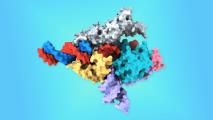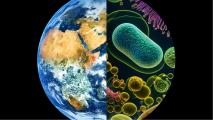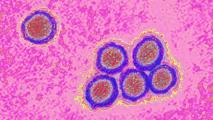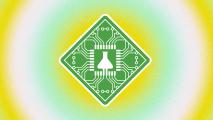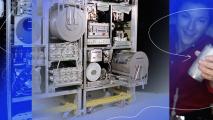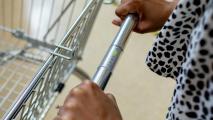
The Digital Frontier
Advancements in 20th century medicine reshaped society and made good health an expectation, not an exception. Now, 21st century breakthroughs may end disease, reverse aging, and restore sight and hearing — perhaps sooner than we think.
More
MIT’s vaccine-enhanced CAR-T cell therapy destroys solid tumors
Adding a cancer vaccine to CAR-T cell therapy, a revolutionary treatment for blood cancers, boosts its efficacy against solid tumors.
Quantum biology: Your nose and house plants are experts at particle physics
Quantum processes, normally associated with the very small or very cold, have been found to occur in biological systems. This was unexpected.
The US just certified its first fully electric flying car
Alef Aeronautics’ Armada Model Zero is the first fully electric flying car to secure a certificate of airworthiness from the FAA.
Astronomers use dead stars to measure gravitational waves produced by ancient black holes
As research challenges theories of how galaxies evolved, studying the era after the Big Bang using gravitational waves could be invaluable.
“Zombie” cells are the key to a tiny sea creature’s full-body regeneration
A tiny sea creature’s regenerative abilities add to the growing evidence that senescent cells aren’t always detrimental.
How building more backyard homes, granny flats, and in-law suites can help alleviate the housing crisis
Accessory dwelling units, or ADUs, are sometimes called “granny flats,” “backyard homes,” “in-law suites,” or “backyard cottages.”
One shot of the klotho protein boosted memory in old monkeys
A single shot of klotho, a protein linked to longevity, improved the working memory of older rhesus macaques.
Can we train our taste buds for health?
Reformulating foods tailored to the plasticity of our taste buds could be a practical and powerful tool to promote health.
First CRISPR-like system discovered in animals
A CRISPR-like gene-editing system found in animals and other complex organisms has been used to edit human cells for the first time.
New AI translates 5,000-year-old cuneiform tablets instantly
Translating an ancient language is a time-intensive process, and only a few hundred experts are qualified to perform it. Could AI do the job?
Extreme weather accelerates deadly disease. This is how we fight back.
Meet the scientists uncovering the link between extreme weather patterns spurred by climate change and disease outbreak – and how they plan to prevent the next global pandemic.
New meningitis vaccine is the first to cover new emerging strain
A new meningitis vaccine that protects against five bacterial strains outperformed an existing shot in a phase 3 trial.
The world needs hundreds of thousands more offshore wind turbines – where will they all go?
The huge expansion of offshore wind farms required to meet net zero targets may be achievable, if we can find the right place to put them.
Military vet’s lightweight mask is protecting soldiers from toxic fumes
A Canadian military veteran’s innovative mask is protecting soldiers, police, and first responders from toxic exposure.
Newly identified type of depression affects 27% of patients
Stanford University researchers have identified a new, hard-to-treat type of depression characterized by problems with cognition.
How Mars lost its magnetic field — and then its oceans
Were it not for Earth’s strong magnetic field, our planet would look just like Mars. And strong magnetic fields may be rare in the Universe.
AI-developed drug for deadly lung disease reaches phase 2 trials
AI-driven drug development has led to the launch of phase 2 trials of a drug to treat idiopathic pulmonary fibrosis (IPF).
NASA now recycles 98% of astronauts’ urine and sweat
A new water recycling system on the ISS can recover a record-breaking 98% of the water used by astronauts.
Sooner or later we all face death. Will a sense of meaning help us?
An awareness of our mortality can, paradoxically, move us to seek – and, if necessary, create – the meaning that we so desperately crave.
These shopping carts can tell if you have a common heart condition
A UK study found that ECG sensors placed in shopping cart handles can be used to detect atrial fibrillation (AFib).
Subscribe to the newsletter











